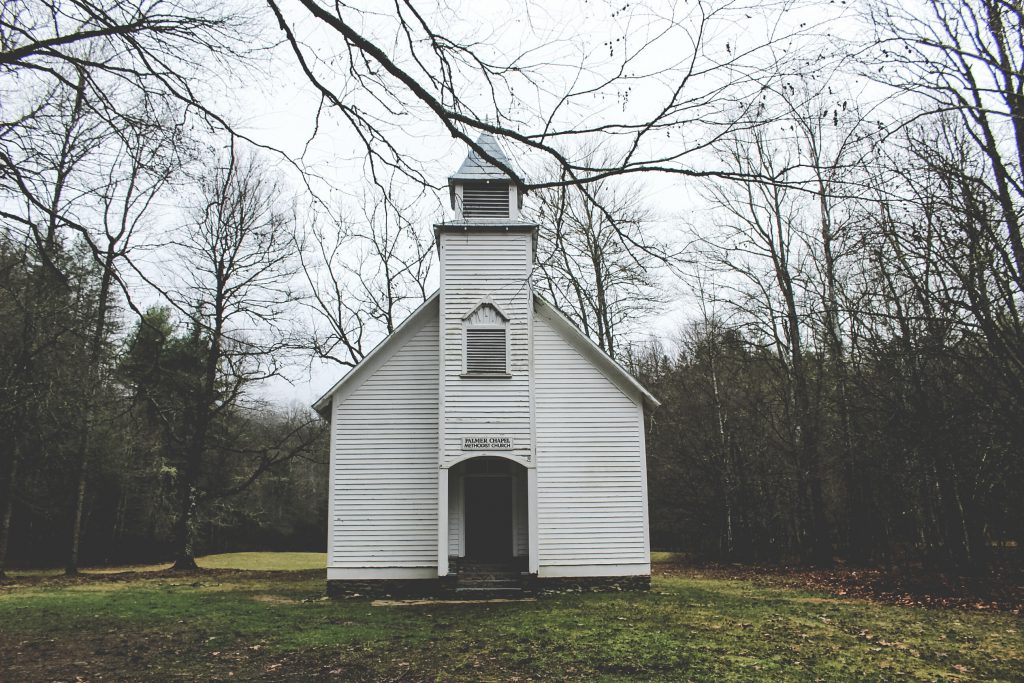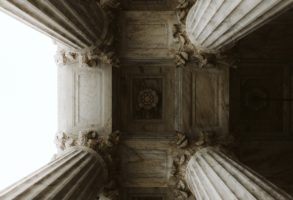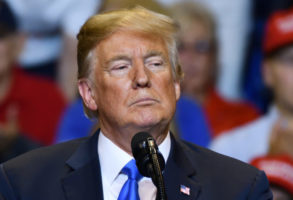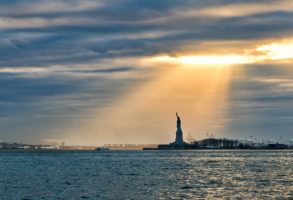
Published January 14, 2021
These remarks are adapted from a December 6, 2020 presentation to a McLean Presbyterian Church Adult Education Class, “A Christian Approach to Politics.”
The relationship between the culture and politics is complex and subtle, so it’s worth saying something about each, starting with culture.
Culture involves far more than what we traditionally think of as politics – for example, art, music, entertainment, social institutions, and customs — whereas politics is one aspect of the work of government and the state. But politics isn’t separate and apart from culture, either, and they certainly interact and influence one another.
It’s been said that culture is upstream from politics, which is generally true; but sometimes politics is upstream from culture, and politics is often viewed as a means to shape culture – for example, the civil rights laws of 1964 and 1965. While those laws were primarily intended to protect certain rights for black Americans, the law was also seen as a moral teacher, as a shaper of sensibilities.
Christians can be culturally influential and not particularly engaged in partisan politics; Christians can be influential in partisan politics and not have much sway over the culture; or Christians can be both culturally influential and engaged in partisan politics.
As for Christians being a cultural minority, that is a proposition that can be debated, depending on what aspects of culture we’re talking about, what region of the nation we’re talking about and even what branches of Christianity we’re talking about: Evangelical, Mainline or Catholic, progressive or conservative. But what I think we can say is that the kind of Christian cultural dominance, the kind of cultural hegemony, that existed in the past doesn’t exist now.
We certainly don’t see the triumphalism we witnessed in the late 1970s and early 1980s, when the Moral Majority was founded. Indeed, the feeling today among many Christians is that they are a moral minority, under attack, and in some quarters there is a palpable, near-existential fear. So the wheel turns, the pendulum swings, times change. And whether Christians are a weakening cultural majority or a cultural minority, it’s always good for us as a community of believers – as followers of Jesus — to ask, and to ask again: What should the Christian relationship be to culture, to politics, and to power? It’s a complicated answer. The privatization of faith and its complete separation from the public realm has a high human cost; yet Christian engagement with politics and culture can have quite a high cost, too.
Sorting out the proper relationship between faith and politics is particularly difficult for Christians. For one thing, the canons of Scripture were decided long before participatory democracy existed; the authors of the Hebrew Scriptures and New Testament did not anticipate a constitutional Republic, checks and balances, and the separation of power. So, the application of faith to politics isn’t obvious and it’s certainly not self-evident.
There’s also this: Unlike Muhammad, Jesus did not set out a political blueprint or ideal of any kind. For Muhammad, the symbol was the sword; for Jesus, it was the cross, an emblem of anti-power. That has to play some role in how we think about power. In addition, Jesus’ followers thought He would come as a conquering, earthly King; Jesus had other things in mind. He lived within a Roman Empire whose existence He rarely mentioned. Jesus’ main arguments were with religious authorities, not political ones. He proclaimed a kingdom “not of this world,” a kingdom based not on an alternative political leadership but on transformed lives.
Yet Jesus, a Jew, was executed as an enemy of the state by Roman authorities. Contemporary leaders, political and religious, found His otherworldly kingdom threatening because it demanded obedience to an authority beyond their own. Jesus’ followers were soon being executed for failing to show proper respect to the Roman emperor. In the Roman world, Christians challenged the political status quo on some issues, like infanticide. Christianity may not have laid out blueprint for an ideal government, but “love your neighbor” has long had social and political consequences.
Christians in every generation have dealt with the same tension. They inhabit, in St. Augustine’s vivid image, the City of Man – the flawed and fallen realm of history, government and politics – while owing their ultimate allegiance to the City of God. This dual citizenship, then, is difficult. Historically, when the faithful have exercised political power, they have sometimes been responsible for oppression and have brought discredit on the faith itself. But when the faithful have ignored political power, they have sometimes brought discredit on their ideals. Sins of omission can be as deadly as sins of commission. So the exercise of politics — as well as the engagement with culture — requires walking a tightrope. Often, we haven’t done it well. Politics is both a temptation and a responsibility; it can act like an addictive drug or a healing medicine.
Craig Barnes, president of Princeton Theological Seminary, told me that when he was in graduate school studying Church history he was taught to seek simplicity — and then distrust it. What his professors meant was to look for interpretative themes in the church past and present — and then humbly acknowledge they don’t always work.
For example, according to Barnes, a common interpretative theme is to claim that historically the church has functioned better as a critique of power, or as one speaking truth to power, than it has as one who has political power or social capital. This would make sense for a religion born out of a cross. And there are plenty of illustrations of this, both positive and negative: from the spiritual vitality of the persecuted early church, to the political and economic excesses of the medieval papacy, to the Amish community forgiving the man who slaughtered their children, and so on.
However, there are times when the church had political power and handled it well. One example is Gregory the Great, a monk who was elected pope against his wishes in the late 6th century. He called himself “a contemplative condemned to action.” Gregory had to assume political as well as religious power. He sold church lands to buy food for the people and pay what soldiers remained, while also introducing new breakthroughs in spirituality, mission, and worship.
In my own experience, I worked for a president, George W. Bush, whose global AIDS initiative, which at the time was the largest program in history to fight a single disease, saved many millions of lives on the African continent. So, I’m hardly indifferent to the good that politics can do. I have friends who have dedicated some part of their lives to deeply admirable causes, from fighting to protect religious liberties to protecting unborn life. Those efforts make a difference, and that’s important to acknowledge.
But back to the past. Calvin and Luther wielded considerable political and social influence; the Anabaptists believed this was an abandonment of the New Testament Church rightly understood. The Niebuhr brothers, Reinhold and Richard, wrote about political realism; Duke’s Stanley Hauerwas and William Willimon wrote about the church as a Resident Aliens that loses its soul when it accommodates to the political and social mainstream. Both Martyn Lloyd-Jones and C.S. Lewis were wary of what Lewis called “morals legislation.” Rod Dreher is an advocate for what he calls “the Benedict Option.”
Churches from the American North and South offered up to God competing prayers and churches argued theologically – and with great passion — on both sides of the slavery question. (The historian Mark Noll’s book The Civil War as a Theological Crisis is an excellent resource on this topic.)*
All of this is a reminder that, as Barnes put it to me, “overarching themes for the church’s historic or current place in society have to bow to the complexity of the church and its manifold manifestations. The more one studies Church history the more one is drawn to humility.” I would add to the importance of humility the virtue of discernment. How to act in any particular historical moment is usually not self-evident. We can all quote Scripture for our own purposes and we can all pull out historical examples to support what we are determined to conclude.
What all of us struggle with, to one degree or another, is confirmation bias, the tendency to look for information that supports, rather than rejects, our preconceptions, typically by interpreting evidence to confirm existing beliefs while rejecting or ignoring any conflicting data; and the unwitting subordination of Scripture and our faith to other things – to ideology, to predispositions, to the culture and community we grew up in, and to many other things. If anyone tells you they see things perfectly objectively, the answer is: They don’t. Because they can’t. Some are better than others, of course; but we all have astigmatisms. At best we see only parts of the truth, glimpses here and there, now and then. As the Apostle Paul put it, we see through a glass darkly.
It’s helpful to recall that just because Christianity has lost cultural power does not mean it has lost influence. The sociologist of religion Rodney Stark has described how a tiny and obscure Messianic movement in the 2nd and 3rd centuries became the dominant faith of Western civilization. He points to early Christians’ “communal compassion” and social networks; their care for the sick, widows, and orphans; their welcoming of strangers and care for outsiders; their respect for women, who were considered (at best) second-class citizens; and their connection to non-Christians.
A long-time friend of mine, Scott Dudley, senior pastor of Bellevue Presbyterian Church, told me that being a cultural minority gives us a chance to go back to our roots of serving and caring. “How Christians, including me, responded to the AIDS crisis in the ’80s haunts me,” Dudley recently told me. “Had we, like the first Christians, cared first and cared most for modern day ‘plague’ victims, I think we’d be in a whole different conversation with the L.G.B.T.Q. community. We may still have significant differences of opinion. However, I believe the dialogue would be one of more mutual respect, and I believe the L.G.B.T.Q. community would feel less afraid of the wounds Christians can inflict.” But even if the conversation were not different, as Dudley knows, caring first and caring most for those victims of a plague would have been the right thing to do.
A few other points to think about, courtesy of Pastor Dudley:
- For 300 years the first Christians followed a certain paradigm; they cared for the poor, plague victims, orphans, widows and created such an attractive counterculture that the movement grew explosively over three centuries until it became the dominant religion. Then, after that, the caring, serving, loving church became, in too many instances, the persecuting, judging, conquering church. Christians lost their distinctiveness, their “saltiness,” and began to look like everyone else in the culture. The first Christians lived out of an entirely different paradigm where loss was gain, where defeat was victory. Is that still relevant today; and if so, what are its implications? I don’t know, actually; but it’s an important question to wrestle with.
- The other thing that attracted pagan Romans to the minority and persecuted movement was the courage they saw in Christians who were willing to die not just for their beliefs, but because of the genuine love and connection they had with the person of Jesus. “In a classical world grown cynical, self-serving, and increasingly only focused on pleasure,” according to Dudley, “the courage, the independence of thought, and the grandness of the martyr’s vision convinced many people that Jesus must indeed be Lord, and there was indeed something good and pure in the world worth dying for. The other word for that is hope. And in a cynical age, hope is powerfully attractive.”
In his book Playing God, Andy Crouch makes a distinction between power as coercion and power as creativity. What Crouch does is demonstrate how Scripture calls us to discipline our power. Wielding power need not distort us or others, he argues, but instead can be stewarded well. People too often abuse their power and play god in the lives of others. Shady politicians, corrupt executives and ego-filled media stars have made us suspicious of those who wield influence and authority. They too often breed injustice by participating in what the Bible calls idolatry. Yet power is also the means by which we bring life, create possibilities, offer hope and make human flourishing possible.
As Crouch’s sub-title suggests, the key is redeeming the gift of power, recognizing that power can be an instrument in the pursuit of justice but that it is easily abused, including by Christians — and when it is, deep damage is done to the Christian witness.
Tim Keller and John Inazu, in their book Uncommon Ground, both praise and criticize America’s “Protestant culture” that has influenced our founders and shaped certain middle-class norms for some part of our history. On the positive side, they mention, among other things, the vast majority of today’s charitable sector, which has its roots in Protestant culture.
But they also point out that this culture has often been indifferent to and even hostile towards the religious freedom claims of religious minorities. The very safeguards Christians are insisting for themselves, now that they feel under attack, are the kind of safeguards they were not so interested in when they were dominant in the culture. As Inazu and Keller put it in their conclusion, “The church has often been a more faithful witness when it lacked political power than at times when it sought control.”
Cherie Harder, president of the Trinity Forum, told me that for the many failings of Christendom, “it has also provided many gifts and protections, including the recognition of human rights and dignity,” she said, adding: “I’m terribly grateful to live within a society shaped by Christendom rather than the other civilizations on historical offer. Christian faith has indeed flourished at times under persecution, but I can’t say I wish for it — persecution, that is — and have noticed that those who seem to express eagerness for the purifying fires of persecution are rarely those who would be the first consumed.”
Staying on this topic for a moment, a psychologist at a Christian university pointed out to me that evoking persecution is a powerful device for strengthening the in-group. “There’s something about sanctifying a group’s perceived struggles which simultaneously imbues them with sacred meaning and provides a sense of moral superiority and righteousness,” he said. “To the degree that the group feels disregarded, they can redouble their belief that they are truly holy and chosen. In this way, it’s a fairly effective defensive mechanism: if they have control in a political or social space, they are leading with religious conviction; if they are the perceived minority and feel persecuted, it’s because of their morality and righteousness. In either case, this preserves the self (and group status).”
That said, there are advantages — along with losses — of cultural minority status. One is simply the ability to see more clearly. Prophets rarely come from privilege.
“At one point in my 20s,” according to Harder, “it suddenly dawned on me why pride comes before a fall: it blinds. The problem with pride, prejudice and privilege is that they distort and obscure one’s ability to see reality and apprehend truth. The prideful do not see the pit or the snare; it becomes only a matter of time before they stumble into one or over the other. And conversely, the most searching, penetrating critiques often come from those who lack status, whose lowly status offers an unencumbered view.”
Eugene Petersons wrote The Jesus Way. He argues that the American church is enamored with the truth of Jesus but ignores the method by which Jesus embodied that truth. Christianity is obviously not just about affirming a particular creed or set of dogmas but following the ways of Jesus — modeling one’s ways and means after His. That goes for every area of our lives, including politics and cultural engagement. According to Peterson, “We can’t suppress the Jesus way into order to sell the Jesus truth. The Jesus way and the Jesus truth must be congruent.”
One hope is that a time of (relative) cultural exile might be a time of re-formation into the ways of Jesus. I will say that when I think about my vocation, and my witness, I am acutely aware of how challenging it is to embrace the Jesus Way, and how often I have fallen short of it.
Political power and cultural dominance, then, can be used to advance the common good, the moral good, and Kingdom values. But there are plenty of examples in Christian history when things went awry, when worldly power and dominance were snares; and Christian history shows that power as we traditionally understand it is not the pre-condition for being faithful witnesses and a transformative presence in a society.
So what does it mean for Christians to be on the margins — and what opportunities are there are for the Christian church as a cultural minority? We’re certainly not used to thinking in those terms; many of us have been conditioned to think only of the harm that attends to loss of cultural or political power. But there are other ways to think about these things, as several friends of mine have shown me.
I asked Yuval Levin, who is Jewish and therefore part of a minority faith in America, for his thoughts on how Christians might think about such things — and what they might learn from our people of the Jewish faith. He told me that the inability to any longer see yourself as in possession of the institutions and cultural power and political power can actually be clarifying and empowering.
“To say this is our country should mean that we are part of a larger society, to which we owe something and to which we can contribute something,” according to Levin, a scholar at the American Enterprise Institute. “But it’s not necessarily to say that my way of life is dominant here and that in that sense it is mine. And that forces you to try to be persuasive rather than demanding. When you try to be persuasive, you try to be attractive. And that also makes you more effective. It also helps you see what you owe neighbors.”
The Jewish Women’s Voluntary Group Hadassah has a motto that Levin has always loved: “We help people not because they’re Jewish; we help people because we’re Jewish.” He thinks that’s the right way to think about what it is we’re offering as religious people to a larger society that often isn’t where Jews are.
Dr. Levin points out that being a minority is not the worst thing in the world and it is certainly not the worst thing in America. Actually, much strength that comes from that. It enables one to be persuasive, which, after all, is what people who are trying to change souls want to be — and to see not only the loss of social power, but the potential persuasive power of speaking from a place where you say, “I know you don’t agree with me, but I think you should. And here’s why that can strengthen you in ways that we should recognize.”
That’s not to deny that some things of importance will be lost, according to Levin. But there is also a lot to gain in this kind of set of circumstances.
He also told me pre-pandemic that an overriding social challenge of this period is isolation and loneliness, so religious communities should see that they have a special role to play in meeting people’s needs. “What religious communities can offer is not just a kind of philosophy of life but community, unified by a deep common commitment to the truth and a vision of the good,” according to Levin, “and I think religious traditionalists should see that this is what many people are missing now. They need to emphasize the communal character of what they have to offer because that is likely to be especially attractive and powerful.”
What he means by this is we would be far better and more effective if we spoke about what’s at the center and what it is we seek to protect; to portray what we love in a way that is more beautiful and attractive.
Aleading Old Testament scholar, Tremper Longman, recently observed to me that “the church often thrives when it is marginalized and often wilts when it has political power.” He made an interesting comparison between South Korea and China.
In the 1980’s and probably until about ten years ago, Longman told me, American Christians were mesmerized by the growth of the South Korean church and its growing cultural influence, including prominent politicians and even the president being Christians. He gave lectures in South Korea at this time and saw the growth of these megachurches and the growing power of ministers in the country firsthand. In more recent trips he saw and heard stories of significant corruption and abuse of power and how particularly the younger generation is leaving the church. The people he talked to are going back to a “New Testament model” with the hope of reviving the church. Many of his friends there told him that “the problem was growing too powerful in the culture.”
Professor Longman compares what’s happened in South Korea with what he witnessed when he went to China. He used to make annual trips to teach at the University of Peking from about 2008- 2016. He also taught mainland house church leaders in Hong Kong. What he told me is that though the Chinese church is a marginalized minority, it is from all appearances very healthy in comparison with the Korean and American church.
The 19th century Danish theologian and philosopher Soren Kierkegaard was a critic of the Danish State Church which represented Christendom in Denmark. Why? Because he believed Christendom made individuals lazy in their religion. Many of the citizens were officially “Christians” without having any idea of what it meant to be a Christian.
Afew years ago Mark Labberton, president of Fuller Theological Seminary, delivered a lecture, “Creating Beauty in Exile,” that helped me to see things in a different way than I have in the past. In the lecture he offers a distinct way for Christians to conceive of their calling, from people who see themselves as living in a Promised Land and “demanding it back” to living a “faithful, exilic life.” It’s a very different approach, creating different expectations and understanding of our situation, our place, our posture, our purpose.
Dr. Labberton speaks about what it means to live as people in exile, trying to find the capacity to love in unexpected ways; to see the enemy, the foreigner, the stranger, and the alien — and to go toward them rather than away from them. He asks what a life of faithfulness looks like while living in a world of fear.
In the lecture Labberton recounts remarkable stories of people creatively, courageously and faithfully engaging with the world — the woman who lost 41 relatives in the Rwandan civil war and yet finds a way to extend grace amidst the toxicity of bitterness, resentment and hatred; the woman and her guild who made beautiful quilts for those traumatized and suffering in hospitals in eastern Congo, showing there was a place for beauty even in the context of utter dislocation and violence; the church that held traditional beliefs on human sexuality tending to the AIDS garden in Golden Gate Park with humility, love, kindness and compassion and, in the process, developing understanding, trust and meaningful relationships; an African-American student bearing witness to a racial reality he faces that would otherwise go unseen by others; Egyptians on the Fuller campus who, in the aftermath of ISIS killings of Christians in Egypt, turned a memorial service into a celebration of those who were martyred.
Mark Labberton concludes his lecture this way:
“The reason this enterprise of culture care is so critical is because it awakens to us, as [the artist] Mako [Fujimura] often says, no longer talking in terms of culture war but culture care. Culture care is an expression of faithful exilic life. How do we actually show up building houses, planting gardens, loving and seeking justice, being people who seek the shalom of our enemy fortress, for it’s in that shalom that we will find our shalom.
These are calls to a different set of instincts, and I hope that… [we] acknowledge we are in a period where the tectonic plates are shifting; where the church is in one of its deepest moments of crisis — not because of some election result or not, but because of what has been exposed to be the poverty of the American church in its capacity to be able to see and love and serve and engage in ways in which we simply fail to do. And that vocation is the vocation that must be recovered and must be made real in tangible action.”
Five summers ago, nine African Americans were gunned down during a Bible study at Emanuel AME Church in Charleston, South Carolina. The gunman, Dylann Roof, was motivated by racism. Less than 48 hours after the killings, the victims’ families were allowed to speak directly to Roof at his first court appearance. The family members spoke in honest, unaffected ways about their grief and heartache. Yet they bestowed forgiveness upon the man who had killed their loved ones.
It was an extraordinary moment.
These Christians vividly demonstrated how forgiveness can result in not just healing but also political change. Within days of their courtroom statements, then-South Carolina Governor Nikki Haley endorsed removing the Confederate flag from state grounds. Within weeks, the state legislature voted to take it down.
People who would not have reversed course under the threat of boycotts and political attacks changed their minds after amazing acts of grace. Division gave way to unity because a group of wounded Christians elevated the sights and spirit of everyone around them.
The greatest and most powerful Christian distinctive is not the exercise of power; it is the offer of grace.
Those of us who believe in a sovereign God should be the least angry, the least anxious, and the least fearful. One of the most frequently repeated commands in the Bible is, “Fear not.” It’s not that there aren’t real threats, of course; or that those threats might not understandably elicit fear. The point of the “fear not” injunctions, at least as I understand them, is for us to know, deep in our hearts, that God is the author and finisher of our stories, both individually and collectively. He invites us to a calm trust.
“Apocalyptic and hysterical rhetoric is inappropriate for people who are children of the King,” according to James Forsyth, senior pastor at Cedar Springs Presbyterian Church in Knoxville. “Christians should not be characterized by white knuckles of fear and terror.”
Too many of us are.
God’s kingdom has a set of values that should shape us and instill a sense of mission; but God’s purposes ultimately don’t hinge on us. We can rest in the knowledge that God is in control and that things will unfold according to his will and ways. That allows all of us to hold a bit more lightly to the things of this world.
If we understand this moment of cultural weakness in the right way — if we show joy and grace, serenity and hope, even while traveling on roads marked by difficulty — this moment can turn out to be not a calamity but a greater and grander stage for the true, enduring, and life-giving message of the gospel. Which is, after all, what we’re called to bear witness to.
*For those who have not read Professor Noll, he assumes the modern Christian reader knows slavery should be condemned. As a historian, he’s simply showing how the Civil War was furthered on both sides by Christians’ interpretation of Scripture and Providence. One key takeaway from the book is that Scripture is challenging enough to interpret and apply to political/cultural issues, but one should be especially cautious when interpreting Providence.








